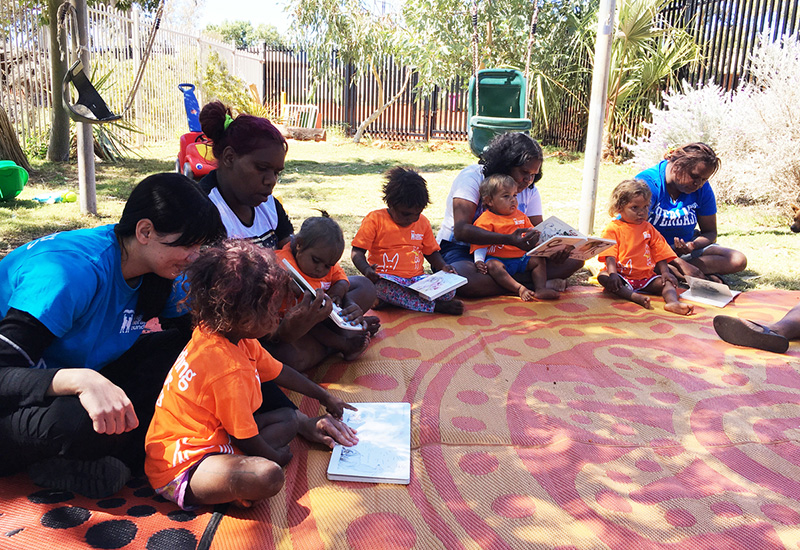Tina Raye working in a community.
[Photo credit: Indigenous Literacy Foundation]
ILF empowers children to love reading
To celebrate Indigenous Literacy Day on 2 September, IPEd Communications Consultant Kate Tilley interviewed Indigenous Literacy Foundation Program Director Tina Raye and Publishing Manager Kathy Mossop.
‘You can’t learn to read if you don’t have access to books.’
That simple statement is why Indigenous Literacy Foundation (ILF) Program Director Tina Raye, a Bardi Jabirr Jabirr and Arabana woman from the Northern Territory, is passionate about her job.
Tina oversees three programs:
- Book Supply, which provides quality books to children and adults in remote communities. So far this year 95,000 books have been gifted.
- Book Buzz, an early literacy program to encourage familiarity with books in children under five with dedicated story-time sessions. Carers are supported to share books with their children in home languages and in English.
- Community Literacy Projects, which produce and publish books by Indigenous people for Indigenous people.
Tina was a school teacher and worked in the Tiwi Islands, north of Darwin, before working on programs to support literacy in remote top-end community schools. In 2013, she moved to Sydney to join ILF.
Tina says the communities differ greatly in the languages they speak and a key function of ILF’s programs is supporting people to translate books into home languages or develop books using stories told by children or elders in the communities.
‘The statistics show that the more remote the community, the lower the children’s literacy levels.
‘But we know that kids in communities are multilingual and incredibly intelligent, so we need to find ways to help them maintain their own culture and language and be supported in the education system,’ she said.
Some community schools have libraries, but children cannot always take books home. Tina and the ILF team provide early exposure to books, and she says it is empowering for children to get books written in the languages they speak at home.
‘If they learn how to hold a book and turn the pages, they develop a love of reading at an early age,’ Tina said.

[Photo credit: Indigenous Literacy Foundation]
ILF Publishing Manager Kathy Mossop says the languages are complex and the biggest challenge is ensuring words and their spellings are correct.
It can be the longest part of the process of getting a book published,’ she told Gatherings.
It is unlike a traditional editing role because the publishers’ editors are not fluent in the languages. Instead ILF is guided by the communities and linguists familiar with the different Indigenous languages.
‘We have good relationships with the communities and usually an elder will have the final say,’ Kathy said.
ILF aims for consistency in style and terminology and there is generally much more checking than in a traditional editing role, with manuscripts going back and forth many times to ensure accuracy.
The remoteness of many communities, particularly during the COVID-19 pandemic when travelling to communities is impossible, adds to the challenges. Internet access is not always available. Sometimes proofs are mailed or emailed to somewhere close by, where pages can be printed and taken as hard copies into communities.
People within the communities translate content by published authors — many of whom are ILF ambassadors — into their home languages, and the books have stickers on each page showing both the home language and English.
ILF partners with major publishing houses for an annual Create Initiative project that sends female senior-school students from the Tiwi Islands annually to Sydney to be mentored by an author, write their own stories, and have them illustrated, edited and published — all within a week.
‘They brainstorm together with an author, a designer, an editor and a publisher. The editing needs to be culturally sensitive to ensure we’re not changing the essence of their stories and that their voices are heard,’ Tina said.
The books are printed overnight so the students can take them back to the Tiwi Islands, but they then go into commercial production and are launched to the trade about 10 months later. Seven Create Initiative books have been published so far. Tina is conscious of ensuring cultural sensitivities are not compromised when the books are published for commercial sale. Some royalties go to ILF to assist in its programs.
ILF also welcomes donations to help fund its programs.

